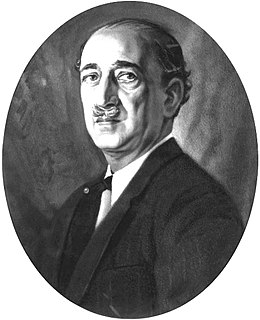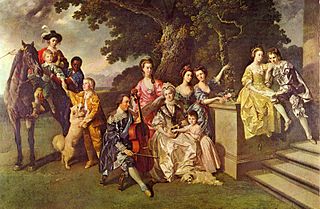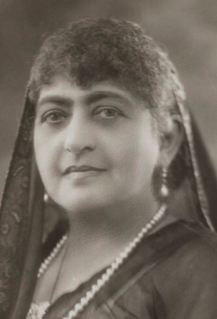Related Research Articles

Jehangir Ratanji Dadabhoy Tata was an Indian aviator, industrialist, entrepreneur and chairman of Tata Group.

Earl of Strafford is a title that has been created three times in English and British history.

Sir Cowasji Jehangir, 2nd Baronet, was a prominent member of the Bombay Parsi community. He was the son of Sir Jehangir Cowasji Jehangir Readymoney, 1st Bt. (1853–1934) and grand-nephew of Sir Cowasji Jehangir Readymoney (1812–1878). He was educated at St John's College, Cambridge.

Sir Cowasji Jehangir Readymoney, CSI was a Parsi community leader, philanthropist and industrialist of Bombay, India.
The Wadia family is a Parsi family from Surat, India currently based in Mumbai, India and the United Kingdom. The family rose to wealth in the mid-1700s as ship-builders serving the British East India Company as the latter established its sway over India. During the declining years of the British Raj, Neville Wadia, scion of the main branch of the family, married Dina Jinnah, only child of Mohammad Ali Jinnah, who caused the partition of India to create Pakistan. Despite being the only descendants of the founding father of Pakistan, the family chose to stick to their mills and factories in India rather than emigrate to the new country. They prospered abundantly under Nehru-Gandhi dispensation and today, they run the Wadia Group of companies, one of the larger industrial conglomerates in India.

The Tata family is an Indian business family, based in Mumbai, India. The parent company is Tata Sons, which is the main holding company of the Tata Group. About 65% of the stock in these companies is owned by various Tata family charitable trusts, mainly the Ratan Tata Trust and the Dorab Tata Trust. Approximately 18% of the shares are held by the Pallonji Mistry family, and the rest by various Tata sons.

Sir Dinshaw Maneckji Petit, 1st Baronet was an Indian entrepreneur and founder of the first textile mills in India, as well as a great philanthropist. He was part of the Petit family and became the first Petit baronet.
The Jejeebhoy Baronetcy, of Bombay, is a title in the Baronetage of the United Kingdom. It was created 6 August 1857 for Sir Jamsetjee Jejeebhoy, a prominent Parsee merchant and philanthropist who was the first Parsi and first Indian to be knighted (1842) and the first to be made a baronet (1857). When Sir Jamsetjee Jejeebhoy was made a baronet, it was realised that the Parsee custom was for a change of names for each generation. This conflicted with the British tradition of using consistent surname for a particular baronetcy. In 1915, the Imperial Legislative Council passed the Sir Jamsetjee Jejeebhoy Baronetcy Act, providing that all the male heirs should take these names and no other. Similar provision was made for subsequent Parsee baronets. All holders of the title relinquish their own names and assume that of the first Baronet. After the incumbent's assumed name, we show his given name, below.

The Sitwell Baronetcy, of Renishaw in the County of Derby, is a title in the Baronetage of the United Kingdom. It was created on 3 October 1808 for Sitwell Sitwell, Member of Parliament for West Looe. The Sitwell family had been ironmasters and landowners in Eckington, Derbyshire, for many centuries.
Sir Jehangir Cowasji Jehangir Readymoney, 1st Baronet, was a prominent member of the Bombay Parsi community. He was the nephew and heir to the childless Sir Cowasji Jehangir Readymoney (1812–1878). He married Dhunbai, daughter of Ardeshir Hormusjee Wadia of the Wadia family, another wealthy Bombay-based Parsi family.
Sir Robert Douglas of Glenbervie, 6th Baronet was a notable genealogist responsible for one of the major works on Scottish families, The Baronage of Scotland.

There have been five baronetcies created for persons with the surname Young, one in the Baronetage of England, one in the Baronetage of Great Britain and three in the Baronetage of the United Kingdom. As of 2014, four of the creations are extant.
There have been six baronetcies created for persons with the surname Brooke, one in the Baronetage of England, one in the Baronetage of Ireland and four in the Baronetage of the United Kingdom. As of 2015 four of the creations are extant, though one has been subsumed into a peerage.

The Petit Baronetcy, of Petit Hall on the Island of Bombay, is a title in the Baronetage of the United Kingdom. It was created on 1 September 1890 for the Indian entrepreneur and philanthropist Dinshaw Maneckji Petit.

Sir Cowasjee Jehangir High School is a co-educational private school in Tardeo, Mumbai, Maharashtra, India. It was established in 1859 by Sir Cowasji Jehangir Readymoney, a notable Parsi community leader, philanthropist and industrialist of the city.
Following the final collapse of the Mughal Empire in 1857 and the proclamation of the British Indian Empire, the British continued to maintain and recognise many of the old Mughal and Hindu styles and titles, introducing a compound honours system which awarded those titles along with British noble and aristocratic titles and knighthoods. Uniquely amongst the countries under British dominion, India was the sole country where British hereditary titles were conferred upon British subjects not of European ancestry. All British titles and honours became obsolete after the formation of the modern Republic of India in 1950, though they continue to be recognised by the British government.

The Readymoney Drinking Fountain, also occasionally known as the Parsee Fountain, is a Grade II listed structure near the middle of the Broad Walk footpath on the east side of Regent's Park, in London. It lies southeast of London Zoo, close to the highest point of Regent's Park, about 41 metres (135 ft) above sea level, in an area with few trees, making it widely visible across the park.

Dhunbai Cowasji Jehangir was an Indian philanthropist and leader of women's organizations, based in Bombay.
References
- Kidd, Charles, Williamson, David (editors). Debrett's Peerage and Baronetage (1990 edition). New York: St Martin's Press, 1990.
- Leigh Rayment's list of baronets